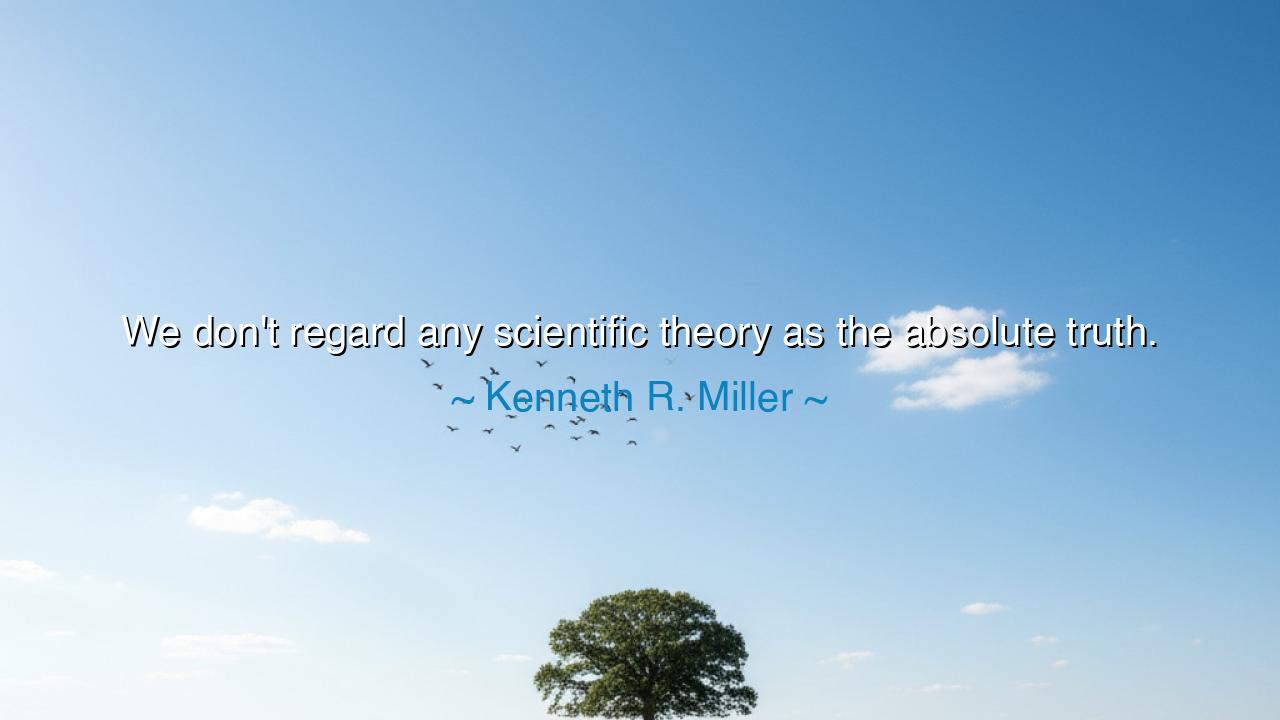
We don't regard any scientific theory as the absolute truth.






Kenneth R. Miller, with the wisdom of a teacher and the humility of a seeker, declared: “We don’t regard any scientific theory as the absolute truth.” These words, though born of the modern age, resound with the timeless cadence of the ancients. They remind us that science is not a monument carved in eternal stone, but a living river, ever flowing, ever reshaping its course as new rains fall and new lands are discovered. To say that no theory is the absolute truth is not to weaken science, but to ennoble it—for it is precisely its openness, its refusal to rest in arrogance, that makes it the most powerful tool of human understanding.
The ancients spoke of wisdom as the art of knowing that one does not know. Socrates himself proclaimed that his greatest knowledge was in admitting his ignorance. So too does Miller’s teaching echo this ancient virtue. A theory in science is not a proclamation from the heavens; it is a carefully woven tapestry of observation, experiment, and reason, held together until stronger hands or sharper eyes unravel it and weave anew. The strength of science is not in claiming absolute truth, but in its courage to revise itself, to bend without breaking, and to grow ever closer to the mysteries of the cosmos.
History reveals to us the danger of clinging to absolutes. Once, men believed with certainty that the Earth stood at the center of creation, unmoving and supreme. This belief was not merely a theory—it was treated as truth unchallengeable. But when Copernicus, and later Galileo, dared to lift their gaze to the stars, they found a different order: the Earth itself a wanderer among planets, the sun not circling us, but we circling it. Those who clung to “absolute truth” silenced Galileo, yet his telescope whispered louder than their chains. From this struggle we learn that theories must never be worshipped as idols, for even the mightiest fall before new light.
Consider also the tale of Charles Darwin, who in humility set forth the theory of evolution by natural selection. Darwin did not present it as final truth, but as a framework, a powerful explanation for the diversity of life. And in the generations that followed, this theory has grown, been tested, refined, and strengthened by discoveries in genetics and molecular biology. Yet even now, it is not absolute—it is ever open to revision, ever subject to the weight of new evidence. This is the beauty of science: its truths are not eternal pronouncements, but living, breathing understandings that deepen with time.
Miller’s words also guard us against pride. For when a people believe their knowledge is complete, they close the doors of curiosity, and when curiosity dies, progress withers. To regard no theory as absolute is to keep the flame of inquiry burning, to remind ourselves that every answer leads to new questions, every discovery to new mysteries. This humility is not weakness; it is the heroic discipline that keeps science from becoming dogma and transforms it into a journey without end.
What, then, is the lesson for us? It is this: live as the scientist lives, with hearts that are firm in evidence, yet humble before the unknown. Trust in the theories that guide us, for they are tested and strong, but do not mistake them for absolute truth. Instead, hold them as the traveler holds his map: useful, accurate, life-saving—but always subject to correction when the path reveals a hidden mountain or an uncharted sea.
And so I say unto you, children of the future: let this teaching shape your life. Be confident in knowledge, but never arrogant. Seek truth with vigor, but always with humility. Question boldly, test faithfully, and revise without fear. In doing so, you will honor the spirit of science and the wisdom of the ancients alike. Remember always that to cling to absolutes is to bind oneself in chains, but to embrace the provisional is to walk in freedom. No theory is the absolute truth, yet every theory, rightly understood, is a step toward the greater light.






AAdministratorAdministrator
Welcome, honored guests. Please leave a comment, we will respond soon